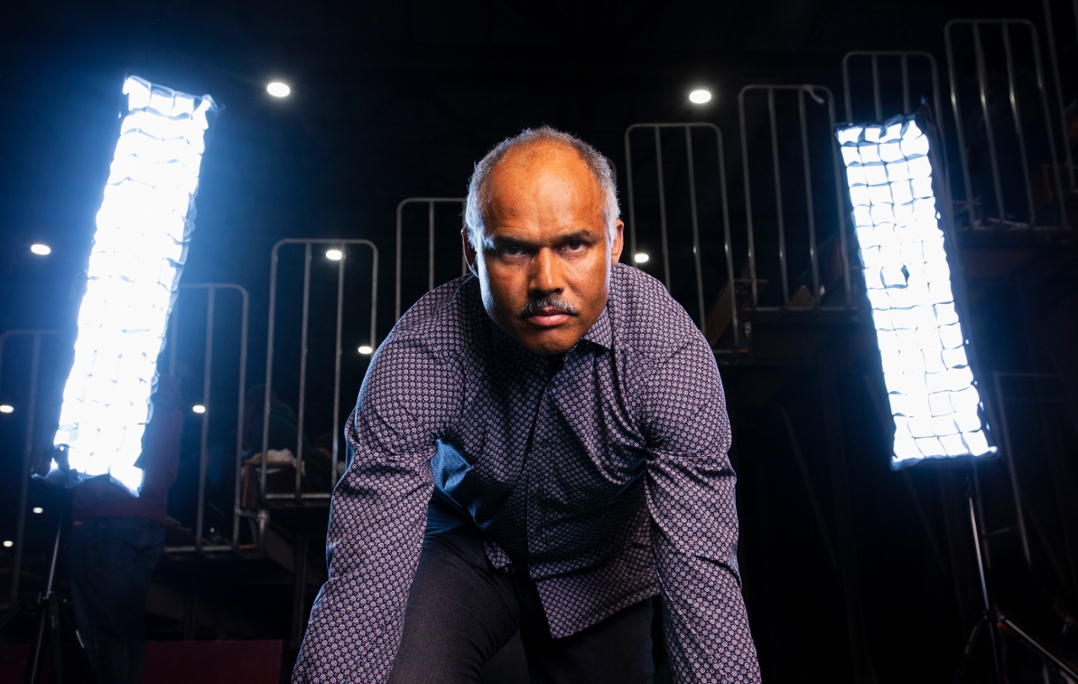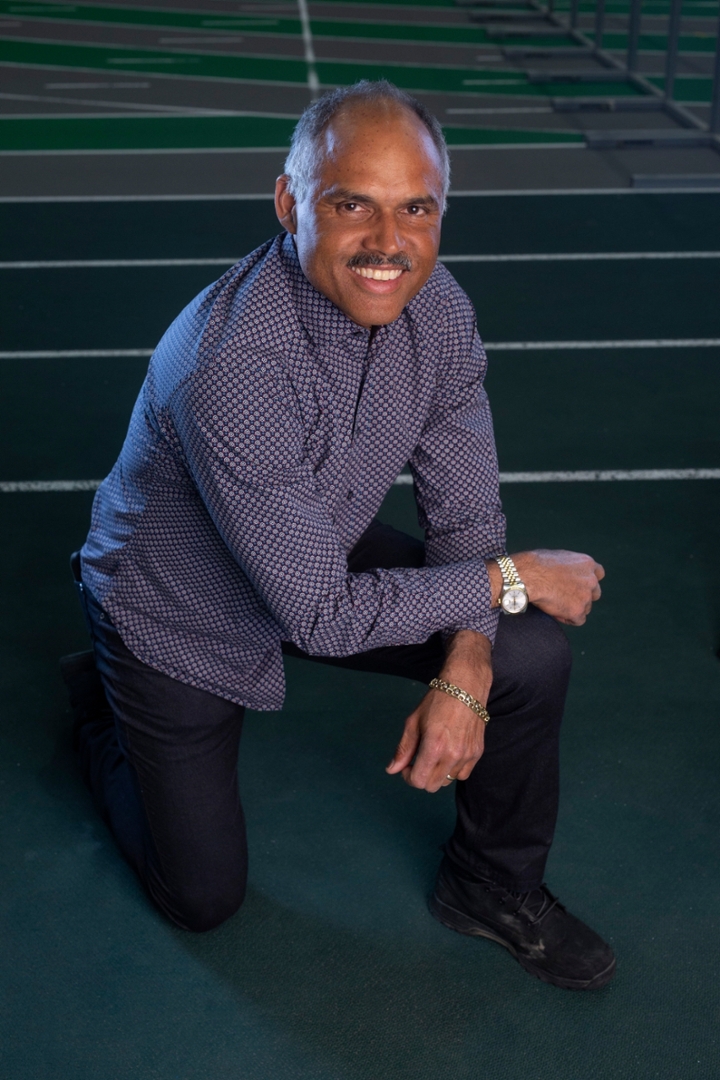
Staying on track
USask helped Cyprian Enweani chase his Olympic dream
By Scott LarsonCyprian Enweani (MD'89) had just come off one of his best indoor seasons in track and field and the 1988 Seoul Olympics loomed on the horizon.
But Enweani was also about to enter his final year of medical school at the University of Saskatchewan.
That meant 36-hour shifts at the hospital and virtually no time to train.
“I had actually decided to retire,” said Enweani, who was one of Canada’s top sprinters.
He was a clean athlete and didn’t think he could go much further in the sport, especially with the demands of his career in medicine.
He was walking down a hallway at RUH when he met Dr. Fred Oleniuk who asked him how his training was going.
Enweani told him he thought he was done because he couldn’t train with the medical demands.
Oleniuk told him to talk to the college to see if they could do something to accommodate his Olympic aspirations.
The late Ken Haight, who had worked with Enweani since he entered med school, helped him find a way to do both.
“Ken Haight was the person that made that work for me,” Enweani said. “He was in my corner the whole time.
“He found a way for me to be part of a national team at the same time I was in medical school.”
The college let him do all his electives first, then take his four weeks of holidays, and if he made the team get six weeks leave of absence.
Two months later, Enweani was in Ottawa where at the national championships he won the 200 metres and a ticket to the Olympics.
“I came back to school and said so I guess I need that six weeks off,” Enweani recalled.
Enweani would go on to finish ninth in the 200 metres at the Seoul Olympics.
“(The College of Medicine) could have shut me down at the beginning (of his school) ... but they supported me all the way through.
“It was always about how to make it work,” Enweani said.
Enweani was a member of the USask Huskies track and field team from 1982-88.
In that time, he won nine Canada West medals, three national medals and the Canada West and national team title in 1986-87. He also competed three times in the FISU World University Games and was Canada’s flag bearer in 1987.
Early years
The Enweanis came to Canada from Denmark in 1971. His father Cyprian Sr. was a veterinarian and they first went to Guelph, Ont. for three years. They moved to Regina for three years before coming to Saskatoon in 1976.
Enweani went to Caswell School Grades 7-8 where the principal at that time was Dennis Berling, an international track official who had just been to the Montreal Olympics.
“He had (former Huskie great) Diane Jones (Konihowski), who had come back from the Olympics, come to the school to give a talk about what it was like to be in the Olympics,” Enweani remembers.
“I went up after and asked her, ‘What do I have to do to get into the Olympics?’
“She just kind of chuckled, but told me to join a track club as a start.”
Enweani would join the school club along with the Saskatoon Track Club and at his first Knights of Columbus track meet he set three bantam records.
Enweani would go on to excel in track and academics at Bedford Road Collegiate before coming to USask.
Class and track
Academics and track have always gone hand in hand with Enweani.
In fact the day he found out he got into medical school was the same day he made his first national track and field team back in 1983.
Enweani was in Vancouver at a meet where he made the national time and phoned home to find out he had been accepted into medical school after just one year of university.
“So I was doing this weird dance with two competing things from Day 1,” he said.
Enweani said it was tough to work your way through medical school while at the same time being an elite athlete and he needed to make a lot of compromises to make both work.
After graduation Enweani went into practice as a family physician while also continuing his track career.

Enweani had thought he’d retire after the 1988 Olympics, but he had just run his three fastest times there.
He continued both careers, but suffered a sports hernia in 1992 while training for the Barcelona Olympics.
It took four years to go away, he said. By then he was in his 30s and stepped off the track.
“I put everything out there,” he said.
He did meet his wife, provincial court Judge Vanessa Monar-Enweani, during this time.
Monar-Enweani is another Huskie great who competed in the long jump.
Enweani even was able to be her coach when she won a long jump medal at the World Student Games.
During the early 1990s, Enweani also started helping out with the Saskatoon Blades hockey club and that relationship has lasted almost 30 years now.
In Enweani’s second year of family medicine at USask, he was paired with Dr. Gerry Bouey who was a partner at a clinic on Lenore Drive. His partner was Dr. Brian Scharfstein who just happened to be the Blades doctor. He got Enweani involved helping with the Blades.
In 1992, Dr. Cliff Bell took over as the Blades doctor and Enweani took over in the mid-‘90s.
Enweani says working with the Blades is fulfilling because the players are happy to have someone that is taking care of them.
He now is getting help with the Blades from Dr. Lonny Viden, much like how Enweani came on board back in the ‘90s.
Enweani and Viden, along with Dr. Mark Ernst, are also do some work helping with the Huskies football team.
Passing the torch
Enweani said he’s now coming to that stage in his career where he will start to slow down his involvement and hand the torch off to another generation of doctors.
“And there will be a young guy that comes along that says, ‘Hey I’m ready to go.’ ” he said.
Then they will have more time to spend with their two kids, Mackenzie and Nathan, who are both in high school, he added.
It took Enweani six years and six weeks to do his five years of medical school while being able to go to the Olympics at the same time.
Enweani was the only graduate from med school at the fall convocation in 1989 and he said it was one of the memorable moments in his life.
“One of my proudest memories was at my fall convocation and being awarded the President’s Medal (acknowledging the student who has shown academic excellence and major leadership and commitment to extracurricular activities),” he said.
The medal told him the university not only acknowledged his efforts, but also that they believed he was going to be a good doctor, Enweani said.


